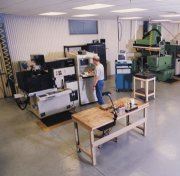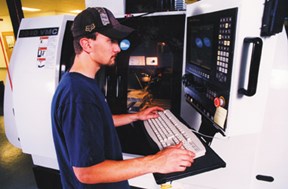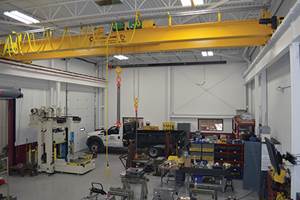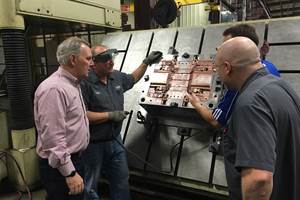Everson Tool: Controlled Growth is Key to Success
A move into a new facility and a focus on lean manufacturing doubled Everson's sales within three year's time.
Far removed from any major city, Everson Tool & Machine (Ironwood, MI) lies in the upper peninsula of Michigan - home to a variety of outdoor activities like skiing, hunting and fishing. However, don't let its rural locale fool you. Kevin Everson has spent the last seven years taking what his father began 30 years ago and building the injection moldmaking company for the automotive, consumer packaging, cosmetics and electronics industries into a multi-million dollar powerhouse by focusing on lean manufacturing and reducing bottlenecks - all with just 14 employees.
Everson literally grew up in the moldmaking business. "My mother was the secretary and she would bring me to work," he recalls. "I would take my naps at the shop. One of our first employees used to go get my mother when I woke up, and today our first and second employees are still working for us."
Working at the shop every summer as a teenager gave Everson some time to figure out where he fit within the company. "Once I made my decision that I wanted to be my father someday, I went out and earned a degree in business and industrial management from Michigan Tech," he says. "With that and my background that I naturally had in tool and die making, everything just came together. About seven years ago I came back and worked directly for my father for a couple of years. He then wanted to retire, so I bought him out.
Room to Grow
Although the company was thriving under his father's leadership, Everson's keen business acumen picked up on the fact that the shop could be even more productive. "Managing time became an important issue and that's what it all came down to for us," he comments. "We are not managing jobs, we are managing time and bottlenecks - and this philosophy alone has completely changed this shop. In the last three years, we've doubled our throughput with the addition of one employee and one machine. We simply looked at our operations and streamlined them. Although our throughput did not double immediately - we did see a 40 percent increase right away - it opened our eyes to other potentials that we needed to discover."
Right around that time the company was building a new 12,000-square-foot facility. As it discovered the bottlenecks in its operation, Everson realized that some of the constraints were due to the way the current facility was laid out and could not be overcome. "That facility just didn't allow us to work efficiently or to grow with our new philosophy," he says. "Now we are in a more organized, cleaner, better-lit environment and our layout really works with what we are doing. Although it was a big investment, it was a necessity in order to double our sales. We should double sales again in a year or two without much more equipment. The investments have been minor in comparison to being able to double your throughput."
Major bottlenecks also were detected in quoting. Everson notes that the company spent way too much time quoting hundreds of jobs to companies that would only give them one or two jobs, so they chose to focus on the customers that they worked with on a continuous basis. Additionally, Everson read and investigated information on strategic cycle time management, and encouraged his employees to come up with ways to improve operations without sacrificing quality - right down to the smallest details. As a result, the mold design department's design time also was improved. "Our process is lean and it has opened up many new avenues for business," he comments. "We have been getting our competitors' molds in for engineering changes because they can't respond in the same time that we can. Our customers want to give us work because we deliver on time all of the time."
Staying Steady
Obviously, the current state of the economy has not affected this mold shop. "This past year was our best year ever and we are busy every day," Everson asserts. "The shops that are adopting an attitude like ours - taking an aggressive approach to their work and staying up with technology - are the ones that are going to succeed. The ones that are not changing with the times are the ones that are going to be left behind - it's a constant state of change and improvement, and as soon as you think that you've fixed everything, you have to reevaluate the shop because it needs to be fixed again.
"Our biggest challenge is to control our growth," Everson continues. "We've seen companies grow too quickly and we have the ability to do this - we're turning jobs away - but we want to maintain a controlled growth where we, as a 31-year-old company, can be a 100-year-old company someday. My biggest fear is that I may be turning away too much work. However, if we take it we must be sure that we can deliver - one late job could cost us a customer forever. We don't want to lose sight of what got us here today, and that's staying up with technology and keeping our employees happy. We don't have any turnover whatsoever. There are certain things that we know we have to do: keep our employees and our customers happy."
Everson accomplishes employee satisfaction with great health insurance and a 401(k) program with profit sharing. Once he has a new employee, he offers them the chance to grow with the company and trains them in all aspects of the business. "We figure that with a solid and dedicated workforce, we'll exceed all of our customers' needs and expectations," he comments. "Plus, we have a great dynamic - a mix of young and veteran toolmakers."
Future plans include automation and lights-out manufacturing. Everson predicts that the year 2002 will bring a 40 percent increase in sales without adding new employees, but making some minor equipment upgrades. "I'm having so much fun doing this and with the best bunch of workers around me - it just makes things so easy," Everson states. "I just love coming here every day, and it's easy to sleep at night."
Related Content
The Trifecta of Competitive Toolmaking
Process, technology and people form the foundations of the business philosophy in place at Eifel Mold & Engineering.
Read MoreMaking Quick and Easy Kaizen Work for Your Shop
Within each person is unlimited creative potential to improve shop operations.
Read MoreDynamic Tool Corporation – Creating the Team to Move Moldmaking Into the Future
For 40+ years, Dynamic Tool Corp. has offered precision tooling, emphasizing education, mentoring and innovation. The company is committed to excellence, integrity, safety and customer service, as well as inspiring growth and quality in manufacturing.
Read MoreOEE Monitoring System Addresses Root Cause of Machine Downtime
Unique sensor and patent-pending algorithm of the Amper machine analytics system measures current draw to quickly and inexpensively inform manufacturers which machines are down and why.
Read MoreRead Next
Are You a Moldmaker Considering 3D Printing? Consider the 3D Printing Workshop at NPE2024
Presentations will cover 3D printing for mold tooling, material innovation, product development, bridge production and full-scale, high-volume additive manufacturing.
Read MoreHow to Use Strategic Planning Tools, Data to Manage the Human Side of Business
Q&A with Marion Wells, MMT EAB member and founder of Human Asset Management.
Read MoreReasons to Use Fiber Lasers for Mold Cleaning
Fiber lasers offer a simplicity, speed, control and portability, minimizing mold cleaning risks.
Read More









.jpg;maxWidth=300;quality=90)













